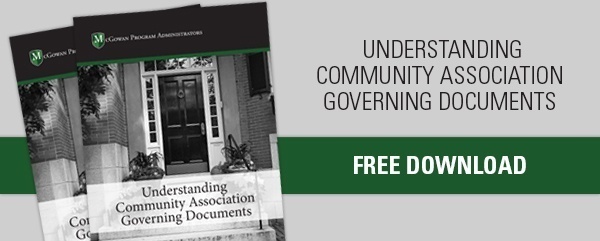Community association volunteer board members often bear the brunt of complaints and challenges when they change rules, make decisions, or pass special assessments. Many times, unhappy unit owners can go so far as to file claims and lawsuits against community associations and their board members.
Even the most conscientious community association boards can find themselves involved in a claim or lawsuit. Still, there are some basic guidelines all associations and volunteer board members can follow to help keep the peace in their community and avoid conflicts.
Read the Governing Documents
The governing documents of a community association are like its constitution. They lay out all the rights and responsibilities of unit owners, the association, and the board members.
Often, unit owners are not familiar with the governing documents of the association and may purchase a unit without knowing anything about the bylaws or how the association operates. At times, unit owners don’t read the documents at all until they have a problem with the board, association, or a neighbor.
Similarly, well-intended volunteers join the community association board without even a basic familiarity with the governing rules and laws.
To help ensure literacy with the governing documents, unit owners should be strongly encouraged to read them before purchasing their unit, and the board should welcome and respond fully to questions unit owners may have.
In turn, a board member should be required to sign off that they have read the governing documents prior to commencing their position on the board.
Annual Board Member Training
An association can help make sure its board members are educated and prepared with an annual training seminar. There are good training resources available from the Community Associations Institute (CAI).
Annual training is an effective and low-cost way to ensure board members know how to manage the association and operate as a board. Good training for board members will lessen the chance of getting entangled in misunderstandings and lawsuits.
Maintain Division of Duties
A community association board is simply a group of individuals who are charged with managing the association and carrying out its duties as established through the bylaws and statutes.
It is important to keep in mind that while the board is tasked with making decisions, a board member outside a meeting isn’t permitted to act in any official capacity. The only exception to this is if permission is expressly given within a meeting for a special circumstance.
To avoid blurring these lines, decisions made within a meeting are best delegated to an employee or a Community Association Manager (CAM). If there is no such individual, it’s important for any board member carrying out such tasks to recognize they are acting as a volunteer and not a board member.
Encourage Informed Unit Owners and Board Members
One of the best defenses against potential misunderstandings, claims, and lawsuits between community association boards and unit owners is making sure both are informed.
In today’s world of digital communication and video, a board can prepare a video about the community including information on the governing documents, board members, and a description of how the board is run. This type of introduction can serve as a foundation for informed unit owners and new board members.
Healthy Community Association Meetings
Board meetings are the heart of the community association. They should be run according to rules and practices that are established ahead of the meeting and followed consistently.
Well-organized, ordered meetings can help avoid claims and lawsuits.
Some tips for effective and concise meetings include:
- Prepare early: Board members should read and prepare questions on the agenda’s issues prior to the meeting. Doing this ahead of the meeting will save time for discussion.
- Use procedures: The board should have a set of formal rules for conducting meetings. Robert’s Rules of Order may be used as a guide. These formalities work well in board meetings to help maintain order when there are disruptions or heated discussions.
- Stick to an agenda: An agenda is paramount in keeping board meetings on schedule. If an important matter comes up during a meeting that isn’t on the agenda, table it for the next meeting’s agenda.
- Keep it civil: Maintain civility during meetings. Don’t engage with a disruptive individual. If necessary, end the meeting and seek counsel. Don’t entertain out of order or inappropriate questions. Stick to the established rules and agenda of the meeting.
- Have open meetings: Practice open meetings, even if the community association’s governing documents don’t require them. Open meetings can help avoid the appearance of secrecy.
- Keep it under an hour: Keep board meetings under an hour to provide structure and help members stick to the agenda.
Common Sense Risk Management
A deep understanding of the board’s duties, obligations, and limits is critical to a healthy community association. Informed unit owners and engaged board members are among the best risk management tools available to today’s community associations.
The experts at McGowan Program Administrators are here to help your community association run as smoothly as possible, and a large aspect of that is securing the proper insurance coverage. Let us know how we can help you find a policy that’s right for the specific needs of your community association.
Related articles:
5 Ways Community Associations can Protect Themselves from Theft and Fraud
Top Seasonal Threats for Community Associations



